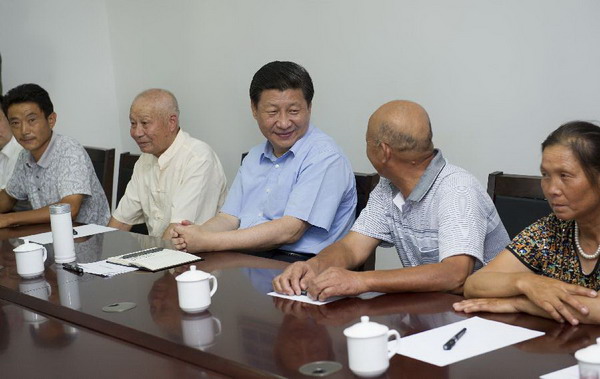Country needs innovation, systematic arrangements to suit national conditions and delegation of power to localities
During an inspection tour of Hubei province in July, President Xi Jinping stressed that China should conduct in-depth studies on major problems in its efforts to advance comprehensive reforms.
Xi's remarks, which are in essence a reflection of the reform strategy of China's new leadership, mean the country has sounded the clarion call for new round of reforms.

Chinese President Xi Jinping (C), who is also general secretary of the Communist Party of China (CPC) Central Committee, talks with villagers during a meeting at Dongshan Village of Changgang Township in E'zhou City, central China's Hubei Province, July 22, 2013. Xi made an inspection tour in Hubei from July 21 to July 23. [Photo / Xinhua]
To further release the dividends produced by reforms, China should not only clear away obstacles and obstructions and fully mobilize available resources, but also work out proper ways and methods to handle relations between top-end institutional design and "crossing the river by feeling the stones", a phrase to describe China's exploring its own development path.
China has scored remarkable achievements in various fields after 30-plus years of reform and opening-up, but a series of difficulties and problems have also emerged, all of which badly need to be resolved through further reforms.
Top-end institutional design, which will focus on systematic and institutional arrangements and pay more attention to issues of overall and strategic importance, has thus become an important method for China to push forward a new round of reforms.
Deng Xiaoping, the late architect of China's reform and opening-up initiative, stressed two decades ago that "reform will touch the interests of many people and thus will encounter numerous obstacles". The reason why we say that China's reforms have entered the deep-water area is mainly that these reforms have encountered huge obstructions, especially from interest groups.
Compared with the initial period of the reform and opening-up policy, during which almost all groups could benefit, deepened reforms in a new era will inevitably touch the vested interests of some groups. How can the country break some old ideological fetters and firmly entrenched interests? Exploring new resources and factors for advancing reforms through the top-end systematic design will play an important role.
A scientific and well-conceived top-end systematic arrangement, in which various interest relationships will become more reasonable and the current unreasonable interest patterns will be smashed, will inevitably ignite more motivation for reforms.